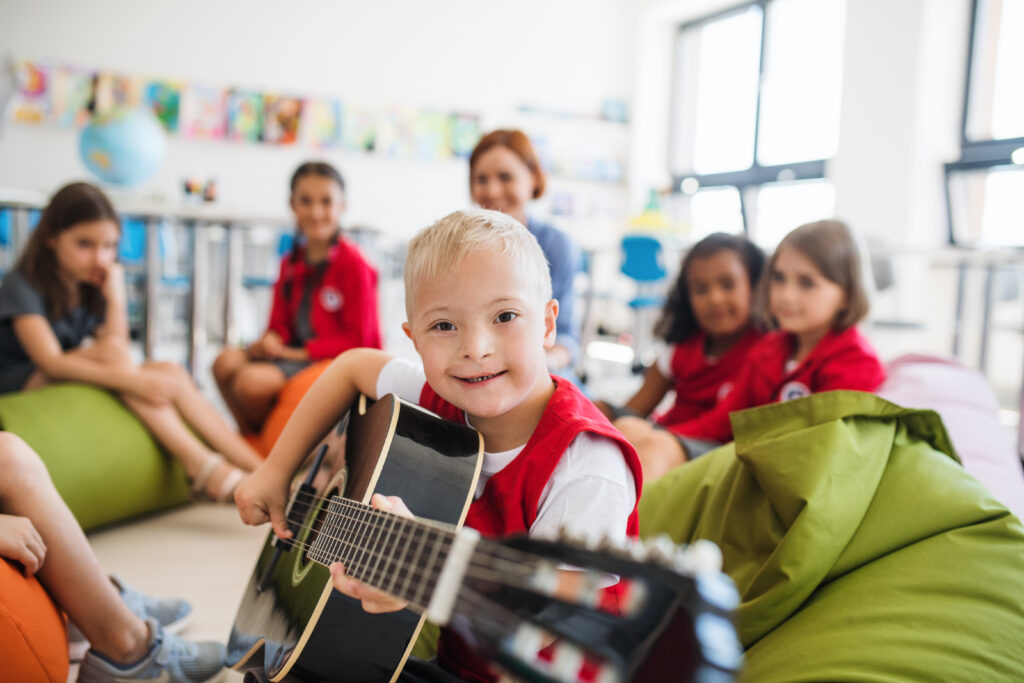
The UN Convention on the Rights of Persons with Disabilities came into force in Germany in March 2009. This includes the right to inclusive education, which means that children with and without disabilities learn together in the same school class. The implementation of this concept brings both opportunities and hurdles.
The term inclusion is derived from the Latin verb "includere," which translates as "to include" in the sense of integrating. The possibility of inclusive education therefore means that children with disabilities are offered the same opportunities and support as their fellow students without impairments.
In an inclusive school, children with and without disabilities attend the same school class. It is important to mention that it is not about integrating the children with special needs into an inflexible school system. The basic idea of inclusion is based on flexibility and individual support. No child should be left behind.
The goal is for the German school system to change so that all children are given the same opportunities. This demands a high level of commitment, time and organization from teachers in particular. In order to be able to respond to the special needs of Needs However, there is often a lack of time, personnel and material resources to deal with the challenges of inclusive classes.

At an inclusive school, students with and without disabilities are taught together. Above all, social interaction benefits from this. By nature, children have little fear of contact when it comes to physical or mental differences. However, if healthy and impaired children are separated from each other, prejudices and potential for discrimination arise.
Inclusive schools therefore make an important contribution to society. Those who learn from an early age that everyone is different acquire greater social skills in adulthood. This is of great advantage in professional life. In turn, children with disabilities are better prepared for everyday life and work.
In addition, inclusion schools also have an economic advantage, as the cost-intensive financing of special schools is no longer required. The savings can instead be invested in meaningful improvements, such as barrier-free teaching materials.
Choosing an inclusive school is an interesting option for many families today. This applies equally to parents of Children with and without impairments. In the following, we would like to take a closer look at the main advantages of inclusion for the students.
Each child has its individual strengths and weaknesses. Nevertheless, at schools without inclusion, all children have to work through the same curriculum at a predefined pace. Those who can't keep up in one or more subjects either lose out completely or have to pay extra privately for Tutoring and promotion.
Inclusive education aims to ensure that each student's talents are nurtured at their own pace of learning. This applies equally to students with and without impairments. In this way, all children benefit from the concept of inclusion.
Parents of healthy children in particular are often concerned that their offspring will not receive sufficient support in an inclusive class. In fact, however, the opposite is true. If inclusion works, all students receive the support they need. Children with disabilities flourish in particular. They achieve a sense of achievement at school, which improves their Motivation to learn further spurred on.
Inclusion is not only about learning. The interpersonal component also plays a crucial role. By integrating rather than separating children with disabilities, their healthy classmates learn that a physical or mental impairment does not determine a person's worth or likability.
Children who attend an inclusive school and receive individual support often achieve better school results. This enables them to gain a foothold in the primary labor market. Unfortunately, the latter is rarely possible with a special education diploma.

The basic idea of an inclusive school is viewed positively by most teachers, students and parents. In order for inclusion to be implemented in schools, it is first and foremost important to provide an optimal educational offering that does equal justice to all students. What this offer should look like in detail is described in a Research report of the University of Würzburg listed.
In addition to classroom design, it is also important to pay attention to accessibility. Schools must be equipped in such a way that impaired children can find their way around as independently as possible. Occupational and physical therapists complement the school concept with their presence. In many cases, it is also necessary for students to be accompanied by a qualified caregiver throughout the school day.
Another goal of inclusion is to bring children with and without disabilities together as a matter of course. This can be achieved, for example, through project work, excursions or all-day activities that go beyond the school curriculum. Teachers should model and teach all students a tactful approach to disabilities and special needs.
To ensure that the (special) needs of individual students can be adequately addressed, class size is a crucial component. If possible, there should be no more than 24 children in an inclusive class. In addition, supervision is provided by two teachers, one of whom must have completed special education training.
With regard to the support needs of impaired children, further adjustments may have to be made. This concerns, for example, the break times between lessons. Participation in excursions and class trips should also be possible for all children. A conceptual understanding between all those involved forms the basis for inclusion to work at schools.
Now we have dealt in detail with the advantages as well as the prerequisites for a successful implementation of inclusion in schools. In the following, we would like to briefly and concisely summarize what a school needs for successful inclusion:
To ensure that inclusion does not remain just a fine-sounding ideal, but can be successfully put into practice, various prerequisites must be met. For the concept to work across the board, a number of things still need to change in German schools. The following is an overview of the challenges that currently exist:
Smooth cooperation between the federal government and the individual states is necessary for inclusion to work. Unfortunately, no uniform line exists yet, so the concept is implemented better or worse in some parts of the country. This is clear from a recent Studypublished by the Social Science Research Center Berlin (WZB).
Teachers often feel left alone when it comes to the topic of inclusion. This is reflected in the current Survey of the Bavarian Teachers' Association (BLLV).
Idealism alone is not enough to successfully implement inclusion. Teachers need targeted training. The lessons themselves should also be accompanied by special education teachers. But here, too, human resources are scarce.
Many school buildings in Germany are in need of renovation and, as a result, are not equipped for people with disabilities. For inclusion to work, our schools must become more digital, modern and, above all, barrier-free. This includes the provision of barrier-free teaching materials and the installation of elevators, ramps and disabled toilets.
Inclusion is a concept that offers many opportunities if implemented properly. This is true on both the social and educational levels. However, whether inclusive school attendance is made possible often depends on the sociocultural and socioeconomic conditions of the parents' home. It is therefore all the more important that parents receive independent and neutral advice when choosing a school.
In addition to its educational mission, an inclusive school has the further task of taking care of the rehabilitative and social needs of its students. This includes, for example, integration into the classroom, support in shaping individual lives, and comprehensive counseling regarding career choices.
Finally, it should be mentioned that inclusion cannot be a rigid concept simply because of the diverse requirements. For implementation to succeed, commitment, flexibility and communication are required on all sides.

